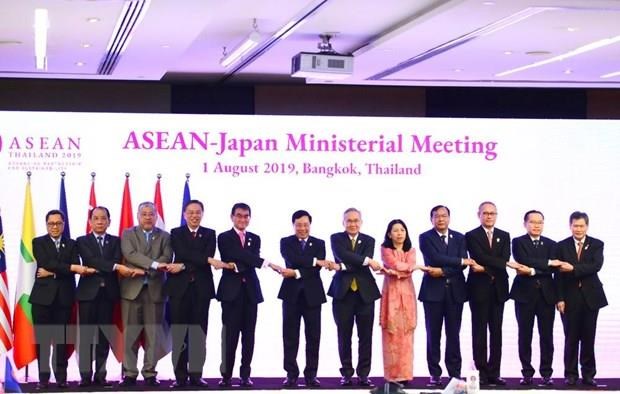 |
|
Participants at the event
|
As a representative of the coordinating country of theASEAN-Japan relations in the 2018-2021 period, Minh recognised the growth ofties between the two sides over the past 45 years with stronger mutual trustand understanding.
He welcomed the progress in the strategic partnership andcomprehensive cooperation between the ASEAN and Japan over the years in keypillars, including the adoption of a joint statement released at the 21st ASEAN-Japan Summit commemorating the 45th founding anniversary ofpartnership, which reaffirmed their strong commitments to promoting theircomprehensive and cooperative partnership.
Participating ministers spoke highly of the support andeffective cooperation that Japan has given to the ASEAN, and lauded thecoordination role of Vietnam.
Minh and other ASEAN ministers proposed a number ofcooperation orientations between the association and Japan in the future,including strengthening collaboration and connection at ASEAN-chaired forums,contributing to dialogue promoting and trust building, upholding internationallaw as well as building and respecting common code of conducts, and effectivelycoping with challenges facing peace, security and stability in the region.
The two sides will enhance their economic-trade-investmentaffiliation, soon concluding the Regional Comprehensive Economic Partnership(RCEP), while expanding cooperation in connectivity, innovation and Industry4.0 adaptation.
They will strengthen cultural exchange and people-to-peopleconnection as well as cooperation areas benefiting the people such as climatechange adaptation, care for the elderly, and sustainable environmentaldevelopment.
Japanese FM Taro Kono affirmed that ASEAN is one of thefocuses in Japan’s external policies, highlighting the country’s commitment topromoting the practical, effective and comprehensive partnership with theASEAN.
Japan lauded the ASEAN’s approval of the ASEAN Outlook onthe Indo-Pacific, he said, expressing his hope that the bloc will promote cooperationin line with the ASEAN principles and Japan’s Indo-Pacific Strategy over areasof mutual interest such as maritime, sustainable development, infrastructureexpansion and connection, smart city, and climate change response.
Regarding regional and global issues, the two sidesrecognised progress in negotiations for a Code of Conduct (COC) in the EastSea, while sharing deep concern over the complicated developments at sea,especially the militarization and unilateral activities complicating thesituation and eroding trust, negatively affecting peace, stability and securityin the region.
Both sides affirmed the significance of maintaining peace,stability, maritime and aviation safety, security and freedom in regional seas,including the East Sea, and stressed that any dispute must be solved bypeaceful measures in line with international law, including the UN Conventionon the Law of the Sea 1982 (UNCLOS 1982).
They underscored the need to fully implement the Declarationon the Conduct of Parties in the East Sea (DOC) and encourage efforts to buildthe effective COC.
Minh lauded the constructive and positive voice of Japanover the matters related to peace, security and stability in the region,expressing his hope that Japan will continue supporting the stance of ASEAN onthe East Sea, contributing to building a sea of peace, stability, cooperationand development.-VNA
 Deputy Prime Minister and Foreign Minister Pham Binh Minh and Japanese Foreign Minister Taro Kono co-chaired the ASEAN-Japan Ministerial Meeting in Bangkok on August 1.
Deputy Prime Minister and Foreign Minister Pham Binh Minh and Japanese Foreign Minister Taro Kono co-chaired the ASEAN-Japan Ministerial Meeting in Bangkok on August 1.